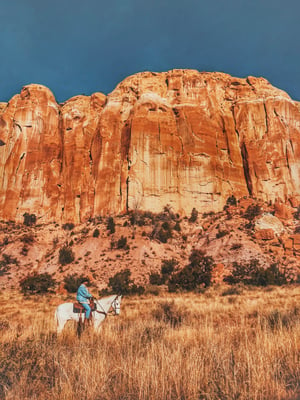 The author is a Mindfulness Coach at Merritt Clubs.
The author is a Mindfulness Coach at Merritt Clubs.
The "Horse with No Name" has a name and you know what it is.
I’ve been through the desert, the horse had a name, I just never told anyone. I wrote these thoughts down a few years ago and I always laugh at the thought. Now they have taken on a whole new meaning.
In his book, “Search Inside Yourself,” Chade-Meng Tan (possibly my favorite person I have never met) recounts the following story:
Once upon a time in ancient China, a man on a horse rode past a man standing on the side of the road. The standing man asked, “Rider, where are you going?” The man on the horse answered, “I don’t know, ask the horse.”
Are you having a light bulb moment here? This may be the greatest story ever told - well, in my assessment anyway. The horse is a metaphor for how many of us live our emotional lives, and now you too know the horse’s name.
Maybe your horse’s name is, “Stress.”
Maybe your horse’s name is, “Frustration.”
Maybe your horse’s name is, “Dissatisfied.”
Probably not any names I would bet on to win the Preakness.
Maybe you let that horse take you to the desert where it can roam with no boundaries, no direction, no sense of how to get back home to the stable. Maybe you want to get off the horse, but you do not know how, where, or when. Maybe that horse is so familiar to you that you just let it take you wherever it wants.
So how do we learn the horse’s name, and then learn to direct it? With mindfulness. It all starts with knowing the horse’s name.
- You have been roaming around the desert with “Frustration” – Yay! You know the name of the horse!
- You know you are not “Frustration” - Yay! That is just your horse and you are you.
- You don’t beat yourself up for riding “Frustration” and realize sometimes he’s just the only horse that’s there.
- You are kind to the horse and you stop feeding the horse with things like “Bitterness” or “Resentment.”
- You notice that “Frustration” has different levels of intensity.
- The horse now has a name and now you will be able to return him and get off.
See? You knew the horse's name all along and now you get to notice when you are riding a different horse – Yay, I am not riding “Frustration.” That is a great thing to notice!
Many of us know what it feels like to let that horse take us anywhere it wants until the darn horse gets exhausted and we end up exhausted as well.
So how do you learn to name and ride the horse? With mindfulness, the process of bringing one’s attention to experiences occurring in the present moment. When we feel a negative emotion, mindfulness can help us cultivate the ability to stop, breathe, identify that emotion, and notice where we feel it in the body. We can then use the practice of mindfulness to not judge the experience, but to simply observe it, reflect where the emotion is coming from, and then respond rather than react.
Mindfulness does not remove emotions from our lives; however, it can change the experience of them.
You can now choose to ride the horse with a name into the desert or decide to get off. La, La, La, La-La, La La...
I invite my clients to use the meditation practice called R.A.I.N. to help observe, reflect, and respond to difficult emotions without attachment or judgement.
- Recognize what is going on
- Allow the experience to be there, just as it is
- Investigate with kindness
- Natural awareness (non-identification), which comes from not identifying with the experience.
Like so many people, I have a client who can get into a “trance” that literally takes her out of the present and lost in looping thoughts. This trance has started several times after a meeting with her boss, which I think we all know what that is like. When she begins sharing about her meeting, I notice her getting worked up, frustrated, and angry with herself.
I invite her to practice R.A.I.N., to pause and begin to recognize what is going on. Recognizing an emotion like anger usually leads to her judging herself or feeling like something is wrong with her. This is the “trance,” kind of like riding the horse that roams around aimlessly.
I then invite her to allow, to just be with the experience and notice thoughts, body sensations, and emotions without judgement. Often when we allow, we can experience the changing nature of our thoughts, feelings, and emotions without the added judgement. We notice where we hold anger in our body, such as tensing up in the chest area and even our hands. We are simply noticing and by allowing this, we can lessen the intensity as we are literally not adding fuel to the fire by reacting to our experience. We are not trying to run away or shove it down.
During the investigation part of the meditation, we explore what is present with curiosity and friendliness. I invite her to ask herself questions for self-exploration: How did this start? Have I felt this way before? What do I need to do? This self-interview invites a friendly, open-ended inquiry, and my client can begin to identify the other elements of the emotion beside the main negative feeling.
The natural awareness/non-identification part of R.A.I.N. is a reminder to my client that while she is feeling angry, she is not “anger.” When you have a negative emotion, you can feel like it is the only part of you that matters at that time. Non-identification means that you have the knowledge that you are a whole person, and this difficult emotion is just a tiny, fleeting part of who you are. Simply see the negative thoughts scrolling past you, mainly caused by outside forces, and detach yourself from them.
Mindfulness is not pushing away our emotions, mindfulness is the workout for our “noticing muscles.” The more we notice what is present for us, the more we can see the changing nature of thoughts, feelings, and emotions. We cultivate the ability to become the driver of our own awareness.
Time to steer the horse!
Shelley Brown is a Mindfulness Coach at Merritt Clubs. For more information about Shelley’s coaching services or to schedule a complimentary wellness assessment with Shelley, please email her at shelleybrown@merrittclubs.com.










